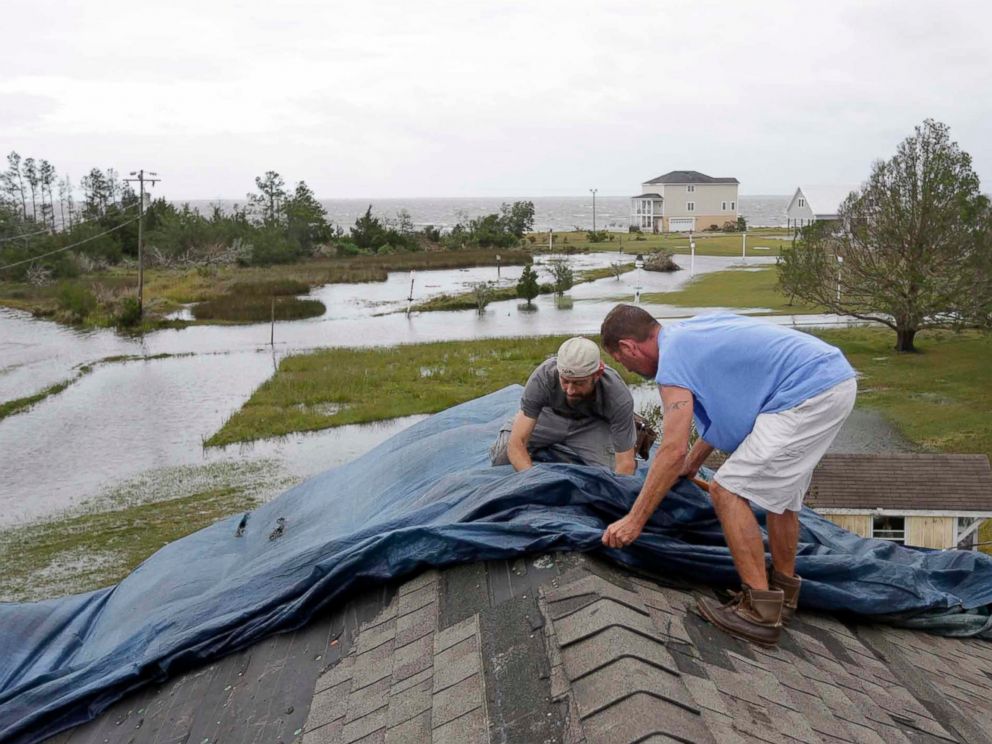Sunday, September 16, 2018
The majority of victims of Hurricane Florence are at risk of crippling debt
Summary:
The devastation caused by Hurricane Florence continues, having already tragically stolen seventeen lives in the last few days and washed poisonous coal-ash from a landfill into nearby waters, but fortunately, many thousands of other lives have been kept safe due to widespread evacuation efforts, and environmentalist groups like the Environmental Protection Agency have been assisting the state in monitoring and containing the pollution caused by the hurricane. However, one issue remains: an appalling lack of federally provided flood insurance for countless homeowners. Analysts and actuaries have calculated that there is an awfully high percentage of people who are underinsured, with less than 10% of people having flood policies or flood coverage, possibly due to overestimates of governmental disaster aid and the severity of damage caused by Hurricane Florence. Ignorance about the fact that standard homeowner insurance does not account for flooding and the declining rate of flood insurance policies over the years also play a large part, according to researchers and insurance experts. Combined, all of these factors spell out an alarming reality that homeowners might be forced into debt once the natural disaster passes; costs for Hurricane Florence could go as high as $20 billion and as low as $10 thousand, which is not very low at all.
Opinion:
Personally, I think that the various misconceptions about Hurricane Florence's impact and the ability of the federal government to compensate for damages and losses can be chalked up to the tendency of the Trump administration to make many optimistic campaign promises and the fact that the executive branch seems to prefer the removal of any fines associated with not taking up any insurance, as seen with its partial dismantlement of the fine associated with the Affordable Care Act, which lessens pressure on the populace to get needed insurance for themselves. Since this is the case, I believe that the country should work on improving and advocating for life-saving flood insurance even further in order to convince people to trust the federal programs that provide it and ensure the wellbeing of American citizens that are affected by Hurricane Florence.
Questions:
Do you think that states should provide flood insurance themselves instead of leaving it all up to the federal government? Why?
What should be done to lessen the economic pressure on homeowners who might not be able to afford to rebuild their lost homes?
Is there any conceivable way to convince the general public that buying flood insurance is a good investment and in their best interest?
Does the political issue of climate change affect who might be interested in purchasing flood insurance? Why?
Sources:
https://www.usatoday.com/story/money/2018/09/16/florence-and-flood-insurance/1327854002/
https://abcnews.go.com/Business/wireStory/florence-expose-gaps-flood-insurance-57857843
https://www.wsj.com/articles/florence-washes-away-portion-of-coal-ash-landfill-in-north-carolina-1537137771
https://www.nationalgeographic.com/environment/2018/09/hurricane-florence-rain-climate-change-science/
https://abcnews.go.com/US/major-river-flooding-threat-posed-florence-heavy-rain/story?id=57857204
Subscribe to:
Post Comments (Atom)

5 comments:
I believe that the it is the federal government that should allocate funds for free/reduced cost flood insurance for all citizens under the median salary along coastal states. To do this, a federal tax increase would be necessary, impacting those who live in inland states as well - to me this doesn't seem unfair. One should not have to pay a disproportionately higher state tax in order to be protected from elements beyond their control - we as a nation ought to bear this cost, as the inland states are already benefiting from not having to be at risk of the flooding happening in other regions of the nation.
I'm not sure how this idea plays out when tried, but, from an economic libertarian point of view, I think it may make more sense to mandate that people buy flood insurance than it would to give it to them. This is something I've heard discussed by John Stossel, that people are building unrealistically much in flood prone areas not because it makes sense on its own, but because they know that the government will insure it from floods.
I see that it may make sense to get the whole nation involved in paying for this, however, the debt and difficulties described in this article do not require that. An individual mandate for home flood insurance would make sure people aren't left in such situations without making people elsewhere in the country pay for where other people chose to live.
I believe that while the federal government should be responsible for a portion of the cost, states should also fund the program, specifically in states that are more prone to floods. I also believe that low income families should get more relief from the costs than those who are able to pay to a certain extent. I agree that as a nation we could all put money towards flood insurance for the states who are more likely to experience floods because states who don't experience floods probably experience other natural disasters such as earthquakes, so money could be put aside through taxes for earthquakes as well. This way people around the nation will be convinced that a tax or insurance is a good thing because it will help everyone when a certain disaster happens in their state.
The most common ways that government can incentivize homeowners to purchase insurance is either through tax credits (a direct deduction in taxes) or tax deductions (a decrease in taxable income). There was controversy behind the individual mandate of the ACA due to the imposed fine of not having healthcare insurance, but I'd imagine there'd be less controversy if the government was giving money rather than taking money away as a fine. The article mentioned a decline in flood insurance availability -- but again, if government subsidizes this market, they could easily make it more available. It's also generally a good idea for government to fund awareness programs in the area that educate residents the type of disasters most common to the area.
Post a Comment